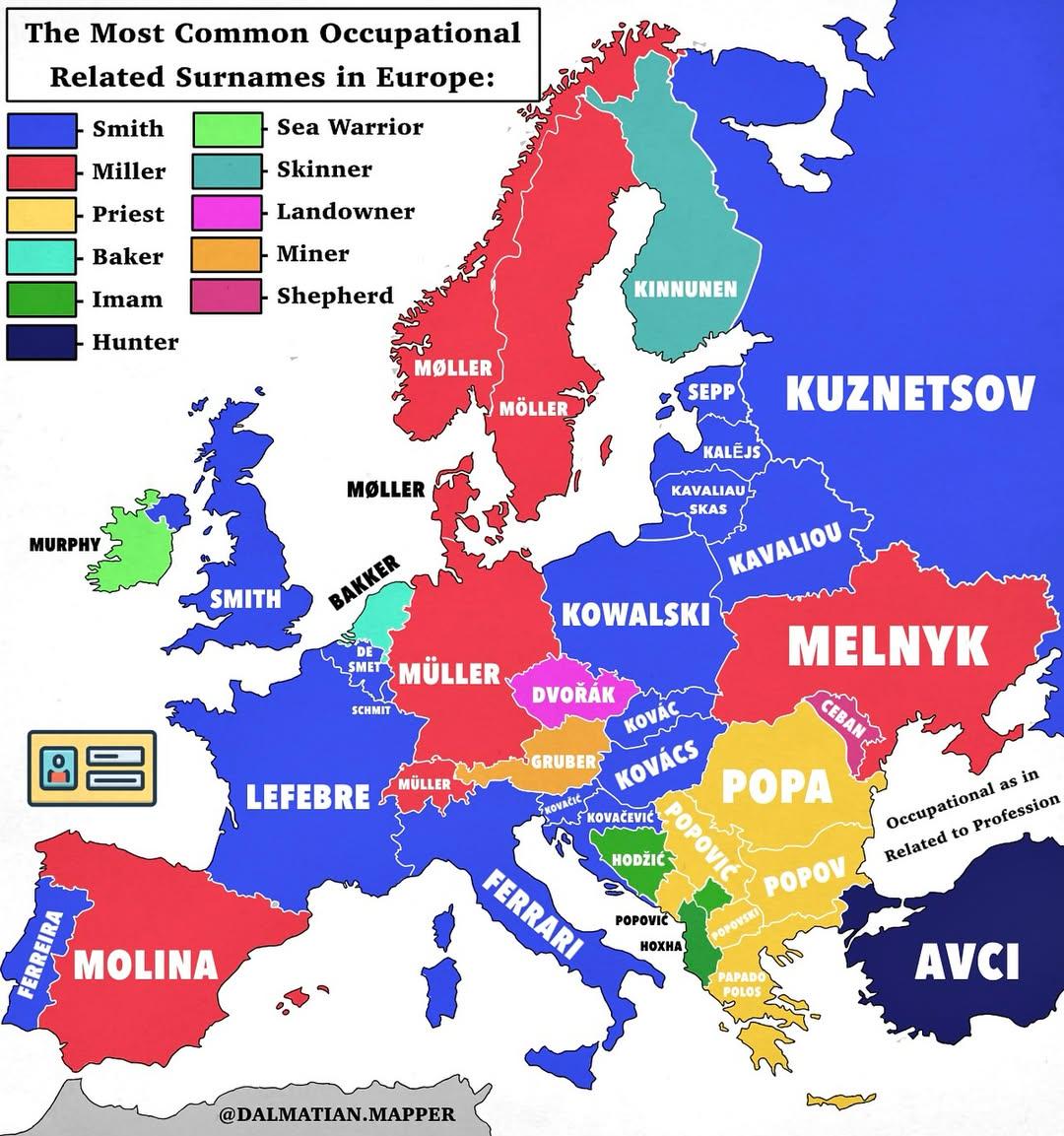Map of Common Occupational Surnames in Europe


David Chen
Data Visualization Specialist
David Chen is an expert in transforming complex geographic datasets into compelling visual narratives. He combines his background in computer science ...
Geographic Analysis
What This Map Shows
The visualization titled "The Most Common Occupational Related Surnames in Europe" provides an intriguing glimpse into the historical and cultural significance of surnames across the continent. It highlights how many surnames have origins rooted in professions, reflecting the socio-economic fabric of various regions. By mapping these surnames, we can uncover not just naming conventions but also historical occupational trends and their geographical distributions.
Deep Dive into Occupational Surnames
Occupational surnames are derived from the jobs or trades that individuals engaged in during earlier periods of society. This naming convention has its roots in medieval Europe, where people often adopted their surnames based on their professions, a practice that was particularly prevalent in English, German, and French cultures. For instance, names like "Smith" indicate a blacksmith, while "Baker" points to the profession of baking bread.
Interestingly, these surnames provide a fascinating lens through which we can understand the historical labor landscape of Europe. According to linguistic studies, around 30% of all surnames in Europe can be traced back to occupations. This trend highlights how intertwined personal identity and profession were in societies where work was a primary source of social standing and economic stability.
Have you ever wondered why certain surnames dominate in specific regions? The patterns often reflect local industries or trades. For example, in regions with a strong agricultural background, you might find surnames like "Farmer" or "Miller" more prevalent. Conversely, urban areas historically known for trade and commerce may show a higher frequency of surnames like "Trader" or "Merchant."
Moreover, this phenomenon isn't limited to just one or two cultures. For instance, in Spain, surnames like "Herrería" (blacksmith) are common, while in Italy, names such as "Fabri" (craftsman) illustrate similar occupational roots. This linguistic diversity across the continent showcases how different cultures have adapted the occupational naming tradition in unique ways.
Statistics reveal that in countries like Germany, occupational surnames such as "Schmidt" (Smith) and "Müller" (Miller) are among the most common. Similarly, in the UK, surnames like "Butcher" and "Baker" remain prevalent. Understanding these patterns not only informs us about the past but also reflects how labor dynamics have evolved over centuries.
Regional Analysis
Examining the map more closely reveals distinct regional trends in occupational surnames. In Northern Europe, for example, surnames often relate to trades associated with maritime activities, reflecting the region's rich seafaring history. Names like "Fischer" in Germany or "Mariner" in the UK can be found in higher concentrations in coastal areas.
Moving to Southern Europe, the emphasis on agriculture becomes apparent. Here, surnames like "Agricola" in Italy or "Hidalgo" (gentleman, often referring to landowners) in Spain highlight the historical importance of land and farming in these cultures. In contrast, Eastern Europe shows a diverse array of surnames that often reflect both agrarian and artisanal traditions, with names like "Kowalski" (blacksmith) in Poland illustrating this blend.
Interestingly, urban centers across Europe tend to have a mix of occupational surnames stemming from a variety of professions, indicating a melting pot of trades. For instance, cities like London and Paris, known for their historical significance in trade and commerce, showcase a rich tapestry of surnames reflecting myriad professions, from "Taylor" to "Cooper."
Significance and Impact
Understanding the geography of occupational surnames provides more than just an interesting trivia point; it opens a window into the socio-economic history of Europe. This topic matters because it reflects how labor has shaped cultural identities and societal structures over centuries. In contemporary society, recognizing these historical roots can foster a greater appreciation for cultural heritage and diversity.
Moreover, as Europe continues to evolve with globalization and technological advances, the way surnames are perceived and utilized may change. Current trends indicate a growing interest in genealogy and the historical significance of names, prompting individuals to reconnect with their ancestral trades and professions. This resurgence illustrates how deeply intertwined our identities are with our historical occupations, even as society progresses into new domains.
In conclusion, the map of occupational surnames in Europe serves as a compelling reminder of how our names are not just labels but historical narratives that encapsulate the essence of our ancestors' lives and work. As we navigate through the complexities of modern society, these insights remind us of the importance of our roots, ultimately shaping our collective identity as Europeans.
Visualization Details
- Published
- September 3, 2025
- Views
- 88
Comments
Loading comments...